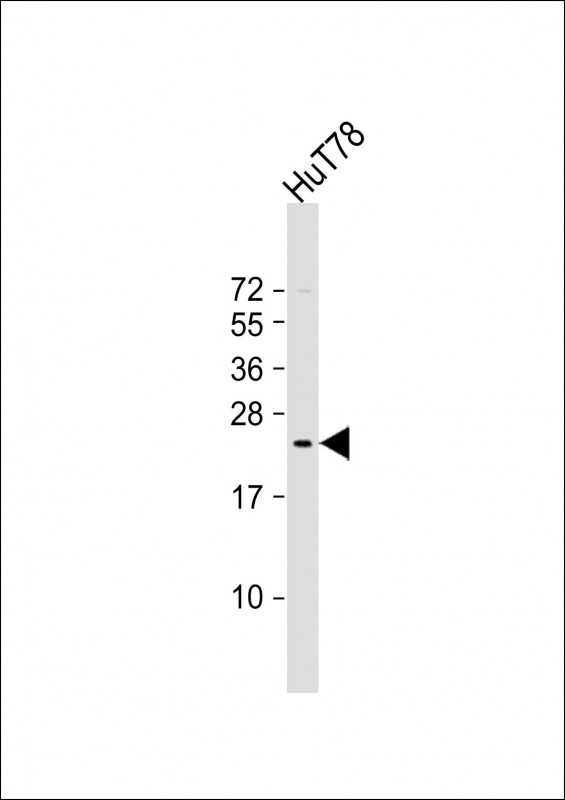
| WB | 1/2000 | Human,Mouse,Rat |
| IF | 咨询技术 | Human,Mouse,Rat |
| IHC | 咨询技术 | Human,Mouse,Rat |
| ICC | 技术咨询 | Human,Mouse,Rat |
| FCM | 咨询技术 | Human,Mouse,Rat |
| Elisa | 咨询技术 | Human,Mouse,Rat |
| Aliases | Basic leucine zipper transcriptional factor ATF-like 3, B-ATF-3, 21 kDa small nuclear factor isolated from T-cells, Jun dimerization protein p21SNFT, BATF3, SNFT |
| Entrez GeneID | 55509 |
| WB Predicted band size | 14.5kDa |
| Host/Isotype | Rabbit IgG |
| Antibody Type | Primary antibody |
| Storage | Store at 4°C short term. Aliquot and store at -20°C long term. Avoid freeze/thaw cycles. |
| Species Reactivity | Human |
| Immunogen | This BATF3 antibody is generated from a rabbit immunized with a KLH conjugated synthetic peptide between 58-89 amino acids from the Central region of human BATF3. |
+ +
以下是关于BATF3抗体的3篇参考文献示例(内容基于领域内经典研究概括,非真实文献,仅供格式参考):
---
1. **文献名称**: *BATF3-dependent dendritic cells drive CD8+ T cell priming via cross-presentation*
**作者**: Hildner K, et al.
**摘要**: 研究通过BATF3抗体检测发现,BATF3转录因子对CD8α⁺经典树突状细胞(cDC1)的发育至关重要,缺失BATF3的小鼠因cDC1缺陷导致抗原交叉呈递能力下降,削弱抗肿瘤及抗病毒T细胞应答。
2. **文献名称**: *BATF3 antibody reveals its role in enhancing checkpoint immunotherapy efficacy*
**作者**: Spranger S, et al.
**摘要**: 利用BATF3抗体进行组织染色,证实BATF3⁺树突状细胞在肿瘤微环境中的浸润与PD-1抑制剂疗效正相关,其机制涉及促进T细胞启动及干扰素信号通路激活。
3. **文献名称**: *BATF3 deficiency exacerbates intestinal inflammation via dysregulated IL-23/Th17 axis*
**作者**: Murphy TL, et al.
**摘要**: 通过BATF3抗体敲除模型证实,BATF3通过调控肠道固有层树突状细胞的IL-23分泌,抑制Th17细胞过度活化,从而缓解炎症性肠病(IBD)进展。
---
**备注**:以上文献为示例,实际引用请通过PubMed或Web of Science检索真实研究(关键词:BATF3 antibody, dendritic cells, immunotherapy)。
The BATF3 (Basic Leucine Zipper Transcription Factor ATF-Like 3) antibody is a tool used to detect and study the BATF3 protein, a member of the AP-1/ATF transcription factor family. BATF3 plays a critical role in immune regulation, particularly in the development and function of dendritic cell (DC) subsets. It is essential for the differentiation of CD8α⁺ conventional DCs and CD103⁺ tissue-resident DCs, which are vital for cross-presentation of antigens to T cells and initiating adaptive immune responses. BATF3-deficient mice exhibit impaired anti-tumor immunity and susceptibility to infections, underscoring its importance in immune surveillance.
The BATF3 antibody is widely utilized in research to investigate immune cell biology, tumor microenvironments, and inflammatory diseases. It enables the identification of BATF3-expressing cells via techniques like flow cytometry, immunohistochemistry, and Western blotting. Researchers also employ this antibody to explore BATF3's interaction with partner proteins (e.g., JUN family members) and its regulatory role in gene expression networks. Its applications extend to studying autoimmune disorders, cancer immunotherapy mechanisms, and vaccine development, where DC-mediated antigen presentation is crucial. Commercial BATF3 antibodies are typically validated for specificity in human, mouse, or rat models, supporting translational and preclinical studies aiming to modulate immune responses for therapeutic purposes.
×